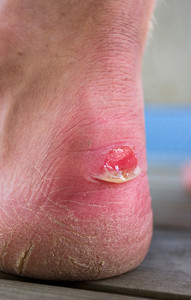
 Although you may be excited to try on your brand new pair of shoes, you should be careful to avoid getting blisters while wearing them. Blisters are not only uncomfortable, but they often force you to walk in an unnatural way to compensate for the pain they cause. Fortunately, there are some tips you can follow to avoid getting blisters and having to deal with them while wearing your new kicks. One tip is to walk around in your new shoes at home prior to wearing them out in public. Wearing your shoes at home will help loosen them up so that the shoes are already broken-in when you are ready for regular use. Another tip is to make sure that you are wearing proper socks. While most people tend to wear ankle socks, they offer very little protection for your feet compared to longer ones. You should also make sure that the socks you wear are made up of a material that dries quickly. A material like cotton, which tends to stay damp for a while, may soften the skin and make you more susceptible to blisters.
Although you may be excited to try on your brand new pair of shoes, you should be careful to avoid getting blisters while wearing them. Blisters are not only uncomfortable, but they often force you to walk in an unnatural way to compensate for the pain they cause. Fortunately, there are some tips you can follow to avoid getting blisters and having to deal with them while wearing your new kicks. One tip is to walk around in your new shoes at home prior to wearing them out in public. Wearing your shoes at home will help loosen them up so that the shoes are already broken-in when you are ready for regular use. Another tip is to make sure that you are wearing proper socks. While most people tend to wear ankle socks, they offer very little protection for your feet compared to longer ones. You should also make sure that the socks you wear are made up of a material that dries quickly. A material like cotton, which tends to stay damp for a while, may soften the skin and make you more susceptible to blisters.
Blisters are prone to making everyday activities extremely uncomfortable. If your feet are hurting, contact Dr. Harris L. Klear of Burlington County Podiatry Associates. Our doctor can provide the care you need to keep you pain-free and on your feet.
Foot Blisters
Foot blisters develop as a result of constantly wearing tight or ill-fitting footwear. This happens due to the constant rubbing from the shoe, which can often lead to pain.
What Are Foot Blisters?
A foot blister is a small fluid-filled pocket that forms on the upper-most layer of the skin. Blisters are filled with clear fluid and can lead to blood drainage or pus if the area becomes infected.
How Do Blisters Form?
Blisters on the feet are often the result of constant friction of skin and material, usually by shoe rubbing. Walking in sandals, boots, or shoes that don’t fit properly for long periods of time can result in a blister. Having consistent foot moisture and humidity can easily lead to blister formation.
Prevention & Treatment
It is important to properly care for the affected area in order to prevent infection and ease the pain. Do not lance the blister and use a Band-Aid to provide pain relief. Also, be sure to keep your feet dry and wear proper fitting shoes. If you see blood or pus in a blister, seek assistance from a podiatrist.
If you have any questions, please feel free to contact one of our offices located in Marlton and Delran, NJ. We offer the newest diagnostic and treatment technologies for all your foot care needs.
Read more about Blisters on the Feet